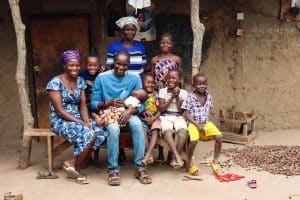In the landscape of rural farming communities, women hold a pivotal role. They are essential agents that drive positive societal, economic, and environmental transformations that are crucial for sustainable growth. Despite this recognition of women’s societal value, they face multifaceted challenges, from restricted access to healthcare and education to limited economic support services. As we commemorate this year’s 16 Days of Action to Eliminate Violence against Women, we highlight how the 4R Nutrient Stewardship Project has tackled some of the issues faced by rural women and how the project aims to forge an inclusive and equitable society.

Rural Commercial Women Group undergoing soap making training in Kpandai, Northern Ghana. Photo credit: Mac-Beth Yakuba
The 4R Solution Project supports women to strengthen their skills to challenge offensive stereotypes. In the African Continent and across the globe, prevailing gender inequalities and discrimination against women have profoundly impacted rural communities. Alarming instances of gender-based violence and child marriage persist, as evidenced by the United Nations Women’s 2022 study. According to the study, a staggering 48,800 women and girls lost their lives at the hands of intimate partners or other family members globally in 2022. This grim statistic translates to an average of over 133 women or girls being fatally harmed each day by someone within their own family. Disparities in access to education, property ownership, decision-making, government representation and wage parity disproportionately affect women. The current global economic trends, marked by escalating living costs, have further strained rural women. Additionally, climate change and environmental degradation have diminished agricultural output, leaving rural women and men in vulnerable circumstances. Women are disproportionately affected by these challenges, and instances of violence against women tend to escalate when there are economic difficulties in the household.
In collaboration with the African Plant Nutrition Institute (APNI), the Co-operative Development Foundation of Canada and Fertilizer Canada, the 4R Solution Project bolsters sustainable agricultural production and elevates women’s representation and influence in leadership roles within co-operatives. As active participants in their local agricultural co-operatives and savings and loans associations, women build their leadership and business skills, and collectively address sensitive issues like gender-based violence.
Aligned with the Government of Canada’s Feminist International Assistance Policy’s action areas focused on Gender Equality and Empowerment of Women and Girls, Inclusive Growth, as well as Climate Action, the project works with established co-operatives and facilitates the formation of Rural Commercial Women’s Groups (RCWGs). Through RCWGs, women strengthen their entrepreneurship skills with tailored training on topics like financial literacy, product handling and marketing,. RCWGs also support knowledge-sharing among women entrepreneurs, and their enhanced access to financial resources and agricultural technologies. Notably, through gender equality dialogue sessions involving community leaders, public sector officials and smallholder farmers, the project has made significant strides in addressing gender-based violence.

The Bapaome family practicing gender-modeling family in Katanga in the East Gonja district of Northern Ghana.
In striving for gender equality, the project has embraced the Gender Model Family (GMF) approach to address gender imbalances within households and communities. This method focuses on equalizing the distribution of unpaid labour through targeted training sessions that emphasize essential principles of gender roles and responsibilities, and equitable division of labour. As families take part in GMF training, they learn how to support one-another and raise awareness in their communities on addressing the disparities in domestic workload between men and women. In fostering a society that challenges traditional gender roles and responsibilities, it is crucial to eliminate the segregation of household tasks based on gender. An equitable division of labor becomes paramount in this pursuit, ensuring that household chores are distributed fairly among all family members, irrespective of gender. This approach aims to break free from the prevalent practice of burdening the girl child with disproportionate responsibilities, while boys are left with idle hands. By promoting a more balanced sharing of household tasks, we contribute to dismantling ingrained stereotypes and fostering an environment where every individual, regardless of gender, contributes to and benefits from a harmonious home life. To date, the project has collaborated with 5,387 Gender Model Families across Ethiopia, Senegal, and Ghana.
Furthermore, the project contributes to the United Nations’ Sustainable Development Goals towards reducing inequality and promoting gender equality. By granting women access to financial services, imparting knowledge on best farming practices and ensuring access to agricultural inputs, the project has fortified the security and sustainability of agriculture in rural areas. The 4R initiative has also elevated the number of women in leadership positions within co-operatives and agricultural extension agencies.
Empowering women isn’t merely an isolated objective; it is a collective effort, and a catalyst for more sustainable, inclusive community development. In Senegal, Ethiopia, and Ghana, the 4R Solution Project stands as a testament to this principle, shaping a future where women pave the way for their communities to thrive.